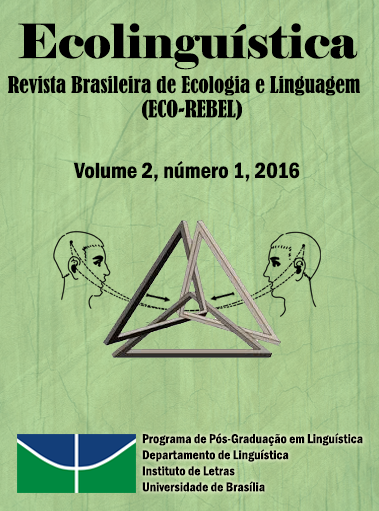As contribuições das ciências cognitivas para ecolinguística
Keywords:
Cognitive Sciences; Ecolinguistics; Ecosystemic Linguistics.Abstract
This paper has as the main objective to list the contributions of Cognitive Sciences to Ecolinguistics, which is a recent approach to language studies. Thus, Ecolinguistics theoretical models that are related to cognitive aspects, such Ecosystemic Linguistics and Dialectical Linguistics, will be presented. It will also present the contributions of cognitive sciences’ second wave and third wave to these different Ecolinguistic theories. Furthermore, it intends to elaborated a proposal which aims to develop Ecosystemic Linguistic theory and to supply tools to analyze several linguistic data, approaching them as mental and ecological phenomena. Finally, a case study will be conducted applying the proposal presented in the paper.
Downloads
References
ALBUQUERQUE, D. B. A língua portuguesa em Timor-Leste: uma abordagem ecolinguística. Tese (Doutorado em Linguística). Programa de Pós-Graduação em Linguística, Universidade de Brasília, Brasília, 2014.
_____. A metodologia em ecolinguística: palavras iniciais. A sair.
BANG, J. C.; DØØR, J. Language, Ecology and Society. A Dialectical Approach. Editado por Sune Vork Steffensen e Joshua Nash. Londres: Continuum, 2007.
_____. The dialects of ecological experiences: an essay in eco-linguistics with a deixis analysis of a newspaper text commenting the Rio-92-Summit on the human environment. In: Da fonologia à ecolinguística: ensaios em homenagem a Hildo Honório do Couto. Thesaurus: Brasília, 2013. P. 328-349.
CALVET, L-J. Pour une écologie des langues du monde. Paris: Plon, 1999.
CAPRA, F. et al. Pertencendo ao universo: explorações nas fronteiras da ciência e da espiritualidade. São Paulo: Cultrix, 1991.
CHOMSKY, N. Aspects of the Theory of Syntax. Cambridge: MIT Press, 1965.
COUTO, H. H. Ecolinguística. Estudo das relações entre língua e meio ambiente. Brasília: Thesaurus, 2007.
_____. Linguística ecossistêmica. 2012. Disponível em: http://meioambienteelinguagem.blogspot.com.br/2012/06/linguistica-ecossistemica.html. Acesso em: 26 Jun. 2012.
_____. O que vem a ser ecolinguística, afinal? Cadernos de Linguagem & Sociedade, v. 14, n. 1, p. 275-313, 2013.
DE JAEGHER, H.; DI PAOLO, E. A. Participatory sense-making: an enactive approach to social cognition. Phenomenology and the Cognitive Sciences, v. 6, n. 4, p. 485-507, 2007.
FILL, A. Ökolinguistics: Eine Einführung. Tübingen: Gunter Narr, 1993.
FROESE, T.; DI PAOLO, E. A. The enactive approach: theoretical sketches from cell to society. Pragmatics & Cognition, v. 19, n. 1, p. 1-36, 2011.
GARNER, M. Language: An ecological view. Oxford: Peter Lang, 2004.
_____. Language ecology as linguistic theory. Kajian Linguistik dan Sastra, v.17, n. 33, p. 91-101, 2005.
HAUGEN, E. The Ecology of language. Stanford: Stanford University Press, 1972.
JÄRVILEHTO, T. The theory of the organism-environment system: I. Description of the theory. Integrative Physiological and Behavioral Science, v. 33, p. 321-334, 1998.
JÄRVILEHTO, T.; NURKKALA, V.-M.; KOSKELA, K. The role of anticipation in reading. Pragmatics & Cognition, v. 17, n. 3, p. 509-526, 2009.
LAMB, S. Pathways of the Brain: The Neurocognitive Basis of Language. Amsterdam: John Benjamins, 1999.
LAKOFF, G. Women, Fire, and Dangerous Things. What Categories Reveal about the Mind. Chicago: The University of Chicago Press, 1987.
MAFFI, L. (ed.). On Biocultural Diversity. Linking Language, Knowledge, and the Environment. Washington/ Londres: Smithsonian Institution Press, 2001.
MAKKAI, A. Ecolinguistics. ¿Toward a New **Paradigm** for the Science of Language? Londres: Pinter Publishers Ltd., 1993.
_____. Die Welt als Bewußtsein und Paraphrase: zur gesamtökologischen Fundierung des menschlichen Sprachverständnisses mit besonderer Rücksicht auf die Sprachphilosophie Wilhelm von Humboldts und ihre Relevanz für die theoretische Sprachwissenschaft des 21. Jahrhunderts. In: FILL, Alwin (org.) Sprachökologie und Ökolinguistik. Tübingen: Stauffenburg Verlag, 1996. p. 77-102.
MUFWENE, S. The ecology of language evolution. Cambridge: Cambridge University Press, 2001.
_____. Language Evolution. Contact, Competition and Change. Londres: Continuum, 2008.
MÜHLHÄUSLER, P. Language of environment, environment of language: a course in ecolinguistics. Londres: Battlebridge, 2003.
NASH, J. Norfolk Island, South Pacific: An empirical ecolinguistic case study. AUMLA ”“ Journal of the Australasian Universities Language and Literature Association, v. 116, p.83-97, 2011.
_____. Insular Toponymies. Pristine Place-naming on Norfolk Island, South Pacific and Dudley Peninsula, Kangaroo Island. Amsterdam: John Benjamins Publishing, 2013.
NENOKI DO COUTO, E. K. Ecolinguística: um diálogo com Hildo Honório do Couto. Campinas: Pontes, 2013.
ROSCH, E. Reclaiming concepts. In: NUNEZ, R.; FREEMAN, W. J. (Eds.). Reclaiming Cognition. Thorverton: Imprint Academic, 1999.
SCHMALTZ, G. F. Por uma ecolinguística do imaginário: arco do amanhecer como metáfora de linguagem, inter-relação e meio-ambiente. In: NENOKI DO COUTO, E. K. N. et al. Antropologia do imaginário, ecolinguística e metáfora. Brasília: Thesaurus, 2014.
_____. Sobre a necessidade de pertencer: anotações para uma metodologia ecolinguística do imaginário. A sair.
SEUREN, P. M. Western Linguistics. An Historical Introduction. Oxford: Blackwell, 1998.
SPITZER, M. The mind within the net: Models of learning, thinking, and acting. Cambridge: MIT Press, 1999.
STEFFENSEN, S. V. Care and conversing in dialogical systems. Language Sciences, v. 34, n. 5, p. 513-531, 2012.
STROHNER, H. Die neue Systemlinguistik: Zu einer ökosystemischen Sprachwissenschaft. In: FILL, A. (org.). Sprachökologie und Ökolinguistik. Tübingen: Stauffenburg Verlag, 1996. p. 49-58.
Downloads
Published
How to Cite
Issue
Section
License
Authors who publish in this journal agree to the following terms:
Authors retain copyright and grant the journal the right of first publication. The work is simultaneously licensed under the Creative Commons Attribution License allowing the sharing of the work with acknowledgment of the authorship of the work and initial publication in this journal.
Authors are authorized to enter into additional contracts separately for non-exclusive distribution of the version of the work published in this journal (e.g., publishing in institutional repositories or as book chapters), with acknowledgment of authorship and initial publication in this journal.
Authors are allowed and encouraged to post and distribute their work online (e.g., in institutional repositories or on their personal page) at any point before or during the editorial process, as this can bring about productive revisions as well as increase impact.
Citation of published works (See The Effect of Free Access).



3.png)



